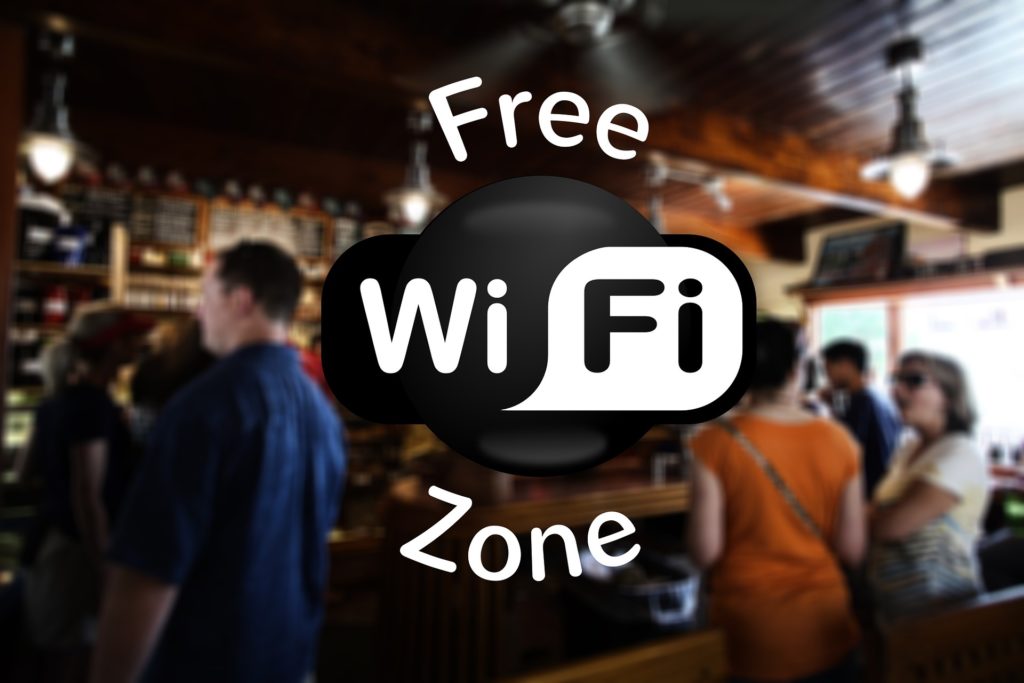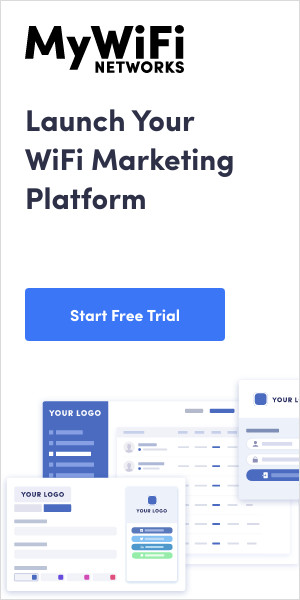When your local client’s visitors get access to free WiFi, it means a lot to them. It may even make some people choose your client’s establishment over the competition.
As important it is to the end-user, guest WiFi can hold even greater significance for your own business and your clients’ businesses. It’s remarkably effective in helping brick-and-mortar locations capture social data, analyze visitor metrics, and automate loyalty marketing.
This article will introduce you to WiFi marketing and the benefits it can provide for resellers like digital marketing agencies and managed service providers. Those benefits are closely linked to the value WiFi marketing can have for your clients’ businesses, so we’ll cover that topic in detail too.
We’ll wrap up with an in-depth look at how WiFi marketing works and what it takes to implement this revolutionary approach to local marketing.
Let’s start with a straightforward definition of WiFi marketing.
WiFi Marketing Defined
WiFi marketing makes it possible for brick-and-mortar businesses that offer on-premise guest WiFi to collect customer data and visitor metrics to help them automate loyalty programs, present targeted digital ads, and optimize all forms of customer communications.
Let’s break that definition down!
The kinds of brick-and-mortar businesses that can benefit from WiFi marketing include any type where people wait or spend time. Airports, shopping malls, restaurants, and auto dealerships are prime examples. The potential applications of WiFi marketing are broad, including many other types of businesses.
Access to on-premise guest WiFi is a big deal for visitors and they’re more than happy to provide valuable personal information to get free internet access. To them, your client’s business is generously providing a needed service at no charge.
Behind this is a strategy in which customer data and visitor metrics are collected and used to do the following:
- Automate loyalty programs—Having a customer’s contact information makes it easy for business owners to cultivate customer loyalty using timely communication that encourages repeat visits.
- Present targeted digital ads—Details about a customer’s behavior, like the time since their last visit, for example, can reveal opportunities for creating highly targeted ad campaigns designed to prompt a return visit.
- Optimize all forms of customer communications—You can get a lot more than a user’s email address from a guest WiFi login screen. Collected phone numbers enable the use of automated SMS messages to engage the audience and having access to users’ demographics via social media opens a fantastic channel for future outreach.
Before moving on, just in case our definition of WiFi marketing leaves any room for doubt, it’s the chance to collect and use customer data that really matters.
Sure, end users love free WiFi, but their ability to access the internet is at the very bottom of the list of things that are important about WiFi marketing. There are huge benefits for resellers and their clients, and that’s the topic we’ll tackle next.

Become a WiFi Marketing Reseller
WiFi marketing offers numerous benefits for resellers and a separate set of benefits for their clients.
We touched on the types of client companies that can take advantage of WiFi marketing, but which companies can benefit from resale opportunities in WiFi marketing?
Digital marketing agencies can boost the performance of their clients’ businesses by collecting guest data and running loyalty marketing campaigns. Managed services providers can turn new and existing guest WiFi networks into a steady source of revenue. VARs and ISPs can enhance their offerings with WiFi marketing. Advertising networks can increase revenue with automated banners and video.
Let’s take a close look at the payoff for resellers like those that provide WiFi marketing services, then cover some of the benefits for their clients.
Benefits for Your Business
As a reseller, you can sell more services, enhance existing services, and provide a broader offering, all by adding WiFi marketing.
A digital marketing agency can employ WiFi marketing to gain valuable insight into the behavior of the customers that come to their clients’ locations. It’s a highly effective strategy for gathering data and automating loyalty programs. In addition, WiFi marketing is easy to sell and easy to implement.
One of the most powerful things about WiFi marketing is how its impact branches out to other aspects of your business. The overflow effect that WiFi marketing can have on other types of campaigns is truly amazing.
For example, if an agency providing email marketing services adds WiFi marketing, with access to the flood of new customer contact data, they’ll make more money from their email marketing campaigns.
A managed service provider, VAR, or ISP offering WiFi marketing can fill a gap in their service offering and differentiate their business from competitors. The service can overlay existing WiFi hardware or businesses can offer a plug-and-play hotspot for resale.
One benefit of a white label WiFi marketing solution like MyWiFi Networks is that it’s an impressive demonstration of your company’s use of technology to engage customers. From the client’s perspective, your branded WiFi marketing service is the evidence that you’ve mastered this modern approach to customer engagement.
Now let’s look at the considerable benefits of WiFi marketing that the client company will enjoy. They’re compelling, which is good—the information below is the reason that WiFi marketing services are so easy to sell!
Benefits for Your Client’s Business
WiFi marketing helps brick-and-mortar locations capture social data, analyze visitor metrics, and automate loyalty programs. It’s all about collecting customer data and using it to enhance promotional activities.
As discussed, the end user’s free internet access is of secondary importance, but it’s worth pointing out that customers absolutely love it. A business owner can delight visitors with a truly valuable service, and it encourages people to visit, stay longer, and return.
But back to the data.
Imagine how much actionable customer data there is when running an e-commerce business! Every interaction, from initial interest to repeat sales is captured, resulting in valuable insights that enable the business to better target its customers and prospects.
If only brick-and-mortar businesses had access to that kind of customer data, right? With WiFi marketing, they can!
WiFi marketing allows businesses to provide personalized customer experience, tailoring the content and timing of their offers based on customer demographics and behavior.
A business can engage visitors using a range of communication channels, including email, SMS, social media, advertisements, and 3rd-party integrations.
Analyzing who connects to their guest WiFi can give client companies a list of people to retarget, and it also reveals details about the behavior of those visitors. How often a customer visits, how long they typically stay, how long it’s been since they last visited—these are the kinds of details that a WiFi marketing service can provide.
When all the input is gathered and combined with a little marketing savvy, businesses can consistently increase guest engagement and customer loyalty.
There may not be any type of marketing, digital or otherwise, that can get a business the kind of actionable customer data that WiFi marketing can, and if there is, it’s surely not as easy and affordable to implement as WiFi marketing is.
Take a classic loyalty card program, for example. It’s complex to set up, expensive to execute, and is not nearly as targeted as loyalty programs based on WiFi marketing data.
A loyalty program driven by WiFi marketing allows a business to create specific targeted offers that can be sent to customers after a certain number of visits or a long absence, for example, or sent based on customers’ purchase history, their demographic profile, or any other data that was collected about them.
We’ve seen the dual benefit of WiFi marketing—it’s a game-changer for resellers and a promotional powerhouse for client companies. Now let’s dig into the details of how WiFi marketing works and how it’s implemented.

WiFi Marketing in Action
When a brick-and-mortar business has customers that hang around for a while, either because they are waiting for something, as in an airport or a car repair center, or because consuming the product or service takes time, as in a café or hotel, being able to access the internet can greatly improve the customer experience. Conscious of their data plan and the associated fees, people will jump at the chance to use a free guest WiFi service.
When businesses started offering WiFi to customers, at first, they were satisfied with the goodwill it created, or they were compelled to provide the service simply to remain competitive. In many cases, WiFi access was provided without requiring the user to provide any personal information.
Marketing was not typically part of the equation, which is a shame, and the scary part is, this wasn’t that long ago.
Now forward-thinking businesses have begun to realize that customers are willing to share some of their information in exchange for access to guest WiFi and they’ve been able to use that customer data to run loyalty marketing programs.
After collecting one or more pieces of contact information about each visitor, like their phone number, email address, or social media info, companies can send timely communication to highly qualified customers and prospects.
The process works like this:
- A guest sees that an open WiFi network is offered by your business and decides to connect.
- The guest is presented with a branded page that prompts them to log in using social media, email, SMS, asks them to leave a review, and more. These options depend entirely on the preferences of your clients and can be added or removed as needed.
- Willing to provide this information in exchange for WiFi access, the customer enters the requested details.
Those three steps happen in about a minute, but collecting even a single piece of customer data can impact the relationship you have with that customer for a long time, making the fourth and final step in the process the most important by far. - In an ongoing series of engagements triggered automatically by the guest’s interaction with your WiFi network, you can encourage return visits and foster loyalty.
That’s a brief look at how WiFi marketing works. Now let’s move on to some implementation details.
WiFi Marketing Implementation
In this section, we’ll discuss what’s involved in implementing a WiFi marketing solution.
With MyWiFi Networks, you can provide an end-to-end solution that includes everything from hardware setup to campaign execution. Digital marketing agencies can go far with that approach.
A managed service provider, on the other hand, would likely take a different approach, adding guest WiFi capabilities without any marketing services. With MyWiFi Networks, the reseller can deliver a professional, fully managed, branded WiFi network and allow the client to run their own campaigns.
Those scenarios represent the two extremes in terms of client company involvement. Let’s dig a little deeper into what resellers can do with MyWiFi Networks and what their clients can do.
Power and Flexibility for Resellers
MyWiFi Networks gives resellers their own white-label WiFi platform. It can be used to monetize their client’s guest WiFi and manage all customer interactions. It’s built on your brand, using your logo and domains.
Marketing automation is simplified when it’s driven by the data collected via a managed WiFi network. Businesses can automatically feed guest data into their marketing processes and define triggers for sending messages, plus there’s integration with social network login, 3rd party CRM, email processing applications, and other popular marketing stack components.
Resellers can use WiFi analytics to gather insightful real-time guest data and create tailored reports for their clients. Collected guest profiles become valuable demographic data that’s easy to filter, analyze, and report on.
Resellers have full control over how the WiFi marketing platform is accessed by clients, a topic we’ll explore in the next section.

A Turn-Key Advantage for Clients
Client companies can be as involved with the solution as they choose.
You can create sub-users and groups with limited permissions, offering clients a simplified, personalized view of the platform. You have the ability to provide remote client access to real-time analytics, enable localization, and let clients schedule their own campaigns.
For managed service providers, ISP, etc., including guest WiFi as a branded addition to your service offering can be lucrative. In such cases, you’ll be able to leverage the platform’s flexibility, granting client access as mentioned above.
A proven approach for marketing agencies, on the other hand, is to offer a turn-key service.
Especially attractive to client companies that are not currently offering guest WiFi, a comprehensive offering is preferable, as it addresses hardware installation, WiFi data collection, and all the advanced marketing activities that follow.
Sell More of What You Sell!
Free WiFi is important to three parties: the end-user, your client, and you.
The end-user loves free internet access. What’s not to love?!
For your client, offering free WiFi is a great way to collect customer data and visitor metrics to automate loyalty programs and optimize customer communications.
For you, the reseller, being able to provide a white-label, managed WiFi marketing service means your clients will get a more complete solution, and that can lead to a sustainable increase in business.
While a lot of companies offer free WiFi, many fail to monetize it. For such a business, the value proposition of WiFi marketing can be extremely compelling.
When you add WiFi marketing to the solutions you provide, whatever they are, you’ll sell more, and that’s great for your bottom line!



1 thought on “Reseller’s Guide to WiFi Marketing”
Pingback: Making the Advantages of Digital Businesses Available for Brick-And-Mortars | MyWiFi Networks